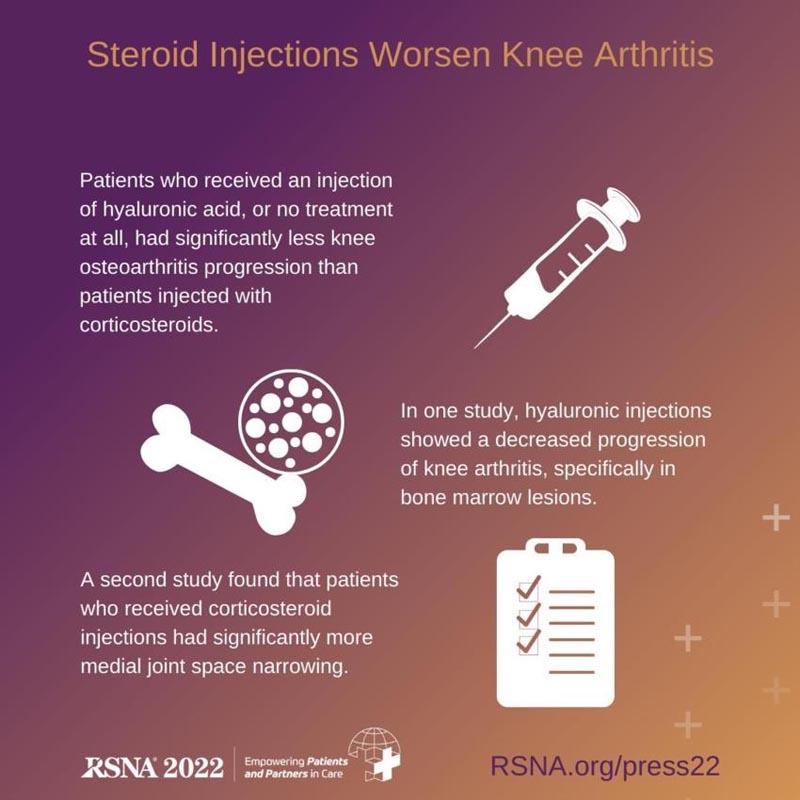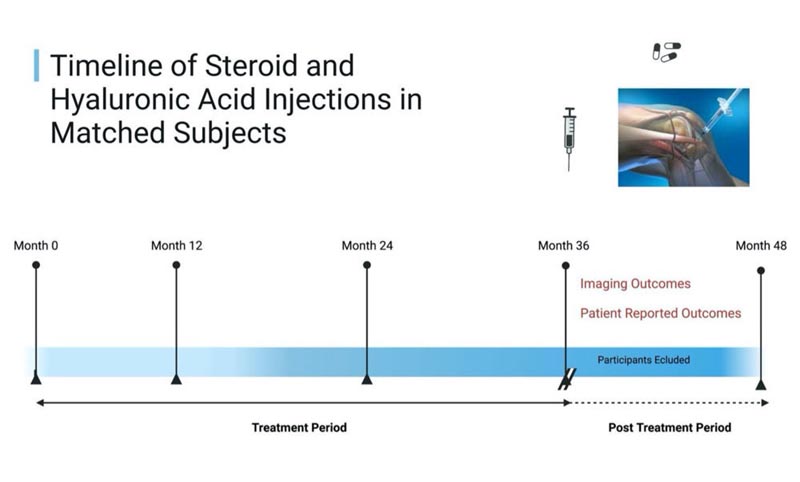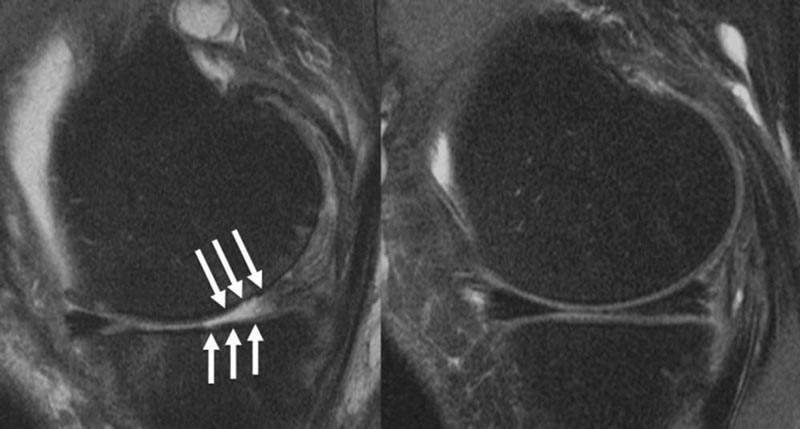Highlights
|

CHICAGO – Two studies comparing injections commonly used to relieve knee osteoarthritis pain found that corticosteroid injections were associated with disease progression . The results of both studies were presented at the annual meeting of the Radiological Society of North America (RSNA).
Osteoarthritis is the most common form of arthritis, affecting 32.5 million adults in the U.S. Osteoarthritis of the knee is a chronic, degenerative, and progressive condition with an estimated incidence of 800,000 patients each year. More than 10% of patients with knee osteoarthritis seek non-invasive treatment to relieve pain through injections of corticosteroids or hyaluronic acid .
Researchers in both studies recruited cohorts from the Osteoarthritis Initiative, a multicenter, longitudinal, observational study of nearly 5,000 participants with knee osteoarthritis that is currently in its 14th year of follow-up.
In the first study, researchers at the University of California, San Francisco included 210 Osteoarthritis Initiative participants, 70 of whom received intra-articular injections and a control group of 140 who did not receive injections over a two-year period. Of the 70 patients who received injections, 44 were injected with corticosteroids and 26 were injected with hyaluronic acid. Treatment and control groups were matched for age, sex, body mass index, pain and physical activity scores, and disease severity.

MRI was performed in all patients at the time of injection and two years before and after. The MRIs were evaluated using the Whole Organ MRI Score (WORMS), a classification system for knee osteoarthritis that focuses on the meniscus, bone marrow lesions, cartilage, joint effusion, and ligaments. . Researchers identified osteoarthritis progression by comparing imaging scores from baseline scans and two-year follow-up scans.

Knee joint of a patient showing (A) severe cartilage defects and (B) intact knee joint.
"This is the first direct comparison of corticosteroid and hyaluronic acid injections using semiquantitative evaluation of whole knee organs with MRI," said Upasana Upadhyay Bharadwaj, MD, a researcher in the Department of Radiology at the University of California, San Francisco. .
Statistical analysis showed that knee corticosteroid injections were significantly associated with the overall progression of osteoarthritis in the knee, specifically in the lateral meniscus, lateral cartilage, and medial cartilage.
Knee hyaluronic acid injections were not significantly associated with osteoarthritis progression in the knee. Compared to the control group, the group receiving hyaluronic acid injections showed decreased osteoarthritis progression, specifically in bone marrow lesions.
"While corticosteroid and hyaluronic acid injections are reported to help relieve the symptomatic pain of knee osteoarthritis, our results conclusively show that corticosteroids are associated with significant progression of knee osteoarthritis up to two years after injection and should be administered with caution," Dr. Upadhyay Bharadwaj said. “ Hyaluronic acid , on the other hand, can slow the progression of knee osteoarthritis and alleviate long-term effects while offering symptomatic relief.”
In the second study, researchers at Chicago Medical School at Rosalind Franklin University of Medicine and Sciences conducted a case-control study that compared the radiographic progression of osteoarthritis in patients who received injections of corticosteroids and hyaluronic acid.
“While these injections provide some patients with short-term pain relief , the effects of the injections on disease progression are unknown,” said researcher and medical student Azad Darbandi.
Darbandi’s team selected a cohort of 150 patients with similar baseline characteristics from the Osteoarthritis Initiative database, including 50 patients who received corticosteroid injections, 50 who received hyaluronic acid injections, and 50 who did not receive injections over a period of time. 36 months. The groups were matched for sex, body mass index, and x-ray findings.
Patients underwent X-ray imaging of the knee at the start of the study and two years later. The researchers analyzed the X-ray images, including joint space narrowing, bone spur formation, and bone thickening around the knee cartilage.
Compared with patients who received a hyaluronic acid injection or no treatment, patients injected with corticosteroids had significantly greater osteoarthritis progression , including narrowing of the medial joint space, a hallmark of the disease.
"Although imaging results for all patients were similar at baseline, osteoarthritis imaging features were worse two years later in patients who received corticosteroid injections compared with patients who received hyaluronic acid injections or no treatment," Darbandi said. “The results suggest that hyaluronic acid injections should be further explored for the treatment of knee osteoarthritis symptoms and that steroid injections should be used with more caution.”
“Knowing the long-term effects of these injections will help osteoarthritis patients and doctors make more informed decisions to manage the disease and the pain it causes,” added Dr. Upadhyay Bharadwaj.















